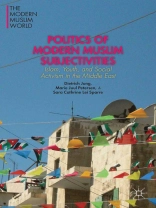Examining modern Muslim identity constructions, the authors introduce a novel analytical framework to Islamic Studies, drawing on theories of successive modernities, sociology of religion, and poststructuralist approaches to modern subjectivity, as well as the results of extensive fieldwork in the Middle East, particularly Egypt and Jordan.
Tabela de Conteúdo
PART I: THEORETICAL AND ANALYTICAL FRAMEWORK: UNDERSTANDING CONTEMPORARY ISLAM WITH THE HELP OF SOCIAL THEORY 1. Modernity, Successive Modernities, and the Formation of the Modern Subject 2. Modern Religion, Religious Organizations and Religious Social Action 3. Islamic Reform and the Construction of Modern Muslim Subjectivities PART II: POLITICS OF MUSLIM SUBJECTIVITIES IN JORDAN 4. State and Islam in Jordan: The Contested Islamic Modern 5. Charity and Social Welfare Organizations in Jordan: Negotiating the Islamic Modern 6. Charity and Modern Forms of Muslim Subjectivities in Jordan PART III: POLITICS OF MUSLIM SUBJECTIVITIES IN EGYPT 7. State and Islam in Egypt: Secular Authority Versus Islamic Modernities 8. New Youth Organizations in Egypt: Charity and the ‘Muslim Professional’ 9. Leaders, Organizers and Volunteers: Encountering Idiosyncratic Forms of Subjectivities Conclusions
Sobre o autor
Author Dietrich Jung: Dietrich Jung is Head of the Center for Contemporary Middle East Studies at University of Southern Denmark (SDU), Denmark. Author Marie Juul Petersen: Marie Juul Petersen is a Postdoctoral Researcher at the Danish Institue for International Studies, Denmark Author Sara Lei Sparre: Sara Lei Sparre is a Ph D student in the Department of Anthropology at the University of Copenhagen, Denmark.












